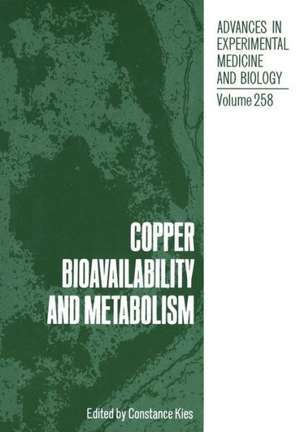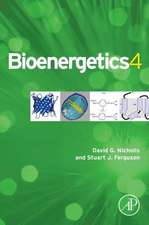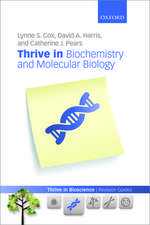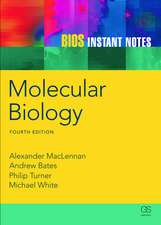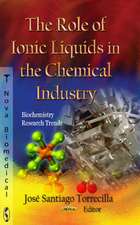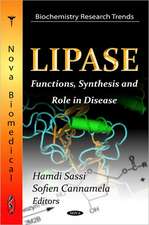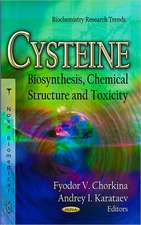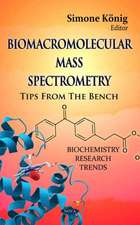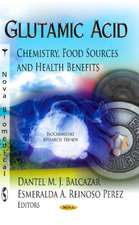Copper Bioavailability and Metabolism
Autor C Kiesen Limba Engleză Paperback – 19 sep 2011
Preț: 730.16 lei
Preț vechi: 890.44 lei
-18% Nou
Puncte Express: 1095
Preț estimativ în valută:
139.71€ • 146.27$ • 115.61£
139.71€ • 146.27$ • 115.61£
Carte tipărită la comandă
Livrare economică 07-21 aprilie
Preluare comenzi: 021 569.72.76
Specificații
ISBN-13: 9781461278559
ISBN-10: 1461278554
Pagini: 324
Ilustrații: XII, 307 p.
Dimensiuni: 170 x 244 x 17 mm
Greutate: 0.52 kg
Ediția:1989
Editura: Springer Us
Colecția Springer
Locul publicării:New York, NY, United States
ISBN-10: 1461278554
Pagini: 324
Ilustrații: XII, 307 p.
Dimensiuni: 170 x 244 x 17 mm
Greutate: 0.52 kg
Ediția:1989
Editura: Springer Us
Colecția Springer
Locul publicării:New York, NY, United States
Public țintă
ResearchCuprins
Copper in Foods and Factors Affecting its Availability.- Food Sources of Dietary Copper.- Stable Isotope Studies of the Effect of Dietary Copper on Copper Absorption and Excretion.- Influence of Ascorbic Acid, Zinc, Iron, Sucrose and Fructose on Copper Status.- Copper Absorption as Affected by Supplemental Calcium, Magnesium, Manganese, Selenium and Potassium.- The Type of Dietary Carbohydrate Consumed During Pregnancy and Lactation Determines Copper Status of the Fetus and the Neonate Rat.- Factors Affecting Copper Absorption in Humans and Animals.- Inhibitors of Copper Bioutilization: Fiber, Lead, Phytate and Tannins.- Copper Absorption and Transport.- Copper Transport: Insights into a Ceruloplasmin-Based Delivery System.- The Biodistribution of Radiocopper-Labeled Compounds.- Metalloforms of Metallothionein Induced by Parenteral Copper: The Influence of Route of Administration.- Mechanism of Copper Transport and Delivery in Mammals: Review and Recent Findings.- Copper Metabolism and Physiological Effects.- Copper and Zinc Status in Moderate Alcohol Intake.- Effect of Estrogen on Serum and Tissue Levels of Copper and Zinc.- Effects of Exercise Training on Human Copper and Zinc Nutriture.- Serum Total Cholesterol and HDL-Cholesterol Levels as Associated with Copper and Zinc Intake in Physically Active And Sedentary Elderly Men and Women.- Modulation of Long Chain Fatty Acid Unsaturation by Dietary Copper.- Ischemic Heart Disease as Copper Deficiency.- Copper Complexes Stimulate Hemopoiesis and Lymphopoiesis.- Exocrine Pancreatic Function of Rats Consuming a High-Fructose, Low-Copper Diet.- Bioavailable Copper Complexes Offer a Physiologic Approach to Treatment of Chronic Diseases.- Changes in Serum Copper and Zinc During Treatment with Anticancer Drugs Interfering withPyridoxal Phosphate.- Effect of Copper on Immune Function and Disease Resistance.- Effects of Inflammation on Copper Antioxidant Enzyme Levels.- Copper-67 Labeled Porphyrin Localization in Inflamed Tissues.- Serum Copper Concentration as an Index of Clinical Lung Injury.- Serum Copper Concentration as an Index of Experimental Lung Injury.
